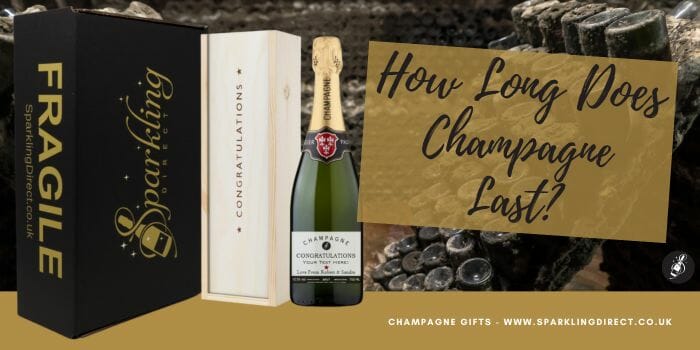
Unopened: Non-Vintage Champagne typically keeps 3–5 years when stored cool and dark; Vintage can keep up to 10–15 years.
Opened: Reseal and refrigerate; best within 1–3 days, can be enjoyable up to 3–5 days depending on the stopper and storage.
Champagne Longevity
| Type of Champagne | Unopened | Opened (resealed & refrigerated) |
|---|---|---|
| Non-Vintage (NV) | 3–5 years | 1–3 days (best), up to 3–5 days |
| Vintage | Up to 10–15 years | 1–3 days (best), up to 3–5 days |
How Long Does Champagne Last Unopened?
Unopened Champagne lasts longest when stored correctly: cool, dark, steady temperature and away from vibration. As a rule of thumb, NV Champagne is designed for earlier drinking (around 3–5 years), while Vintage Champagne—made from a single harvest—can develop beautifully for 10–15 years under good cellaring conditions. Many wine lovers choose to gift Vintage Champagne Gifts for this ageing potential and celebratory feel.
Before opening an older bottle, check for leaks, seepage, pushed or sunken corks, or unusual colour. Any of these can signal poor storage or spoilage.
How Long Does Champagne Last Once Opened?
After opening, oxygen begins to soften the mousse and aromatics. Reseal with a sparkling wine stopper and store in the fridge. For most bottles, Champagne tastes freshest in the first 24–48 hours, but many remain enjoyable for up to 3–5 days. Without a proper stopper, expect noticeable fizz loss within a day. If you’re celebrating with a crowd, consider a larger format like our Magnum Champagne Gifts so every glass is poured at its best.
Does Champagne Go Off?
Champagne doesn’t “expire” like milk, but it can spoil or fade. Heat, light, and oxygen are the main culprits. Over time, bubbles diminish and flavours flatten. If the wine smells acetic (vinegary), sulfury (rotten egg), or tastes dull and stale, it’s past its best. Need a perfectly fresh bottle delivered? Explore our curated Champagne gifts for every occasion.
Signs of Spoilage in Champagne
| Sign | What it can mean |
|---|---|
| Leakage / cork seepage | Heat exposure; possible oxidation |
| Colour turning brownish | Advanced oxidation / age |
| Off-odours (vinegar, rotten egg) | Spoilage; best to avoid |
| Flat, no mousse | CO₂ lost; past best or poorly sealed |
How to Store a Bottle of Champagne
Keep bottles in a cool, dark place at a consistent temperature. For longer-term storage, lay bottles horizontally so the cork stays moist. Avoid warm kitchens, bright light, or garages/lofts with big seasonal swings. If you’re enjoying the bottle soon or sending a present, our Champagne gift boxes arrive in pristine condition and make elegant, ready-to-serve gifts.
| Condition | Ideal Range |
|---|---|
| Temperature (cellaring) | 7–13°C (45–55°F), steady |
| Temperature (opened in fridge) | 2–7°C (35–45°F) |
| Humidity (long-term) | ~70–80% (helps cork integrity) |
| Light exposure | Minimal / dark |
| Bottle position | Horizontal for long-term storage |
FAQs
How long does Champagne last in the fridge?
Unopened bottles can be chilled for serving without issue, but avoid weeks in a standard fridge (it’s too dry and can dry the cork). Opened bottles last 1–3 days (best) and up to 3–5 days if you use a proper sparkling wine stopper.
How long does Champagne last without a stopper?
Expect significant fizz loss within 12–24 hours. A proper Champagne stopper dramatically improves freshness.
Does Vintage Champagne last longer than Non-Vintage?
Typically yes when unopened (Vintage: up to 10–15 years; NV: 3–5 years). Once opened, both styles follow the same short window: best in 1–3 days.
Can Champagne go off if it’s been warm?
Heat is a major cause of premature ageing. If a bottle feels hot or has leaked/pushed cork, flavours may be compromised.
Conclusion
Store Champagne cool, dark and steady. Enjoy NV within 3–5 years and Vintage up to 10–15 years (unopened). Once opened, reseal and refrigerate—it’s best in the first couple of days, with many bottles still enjoyable up to day five. When in doubt, open and enjoy at its freshest!
